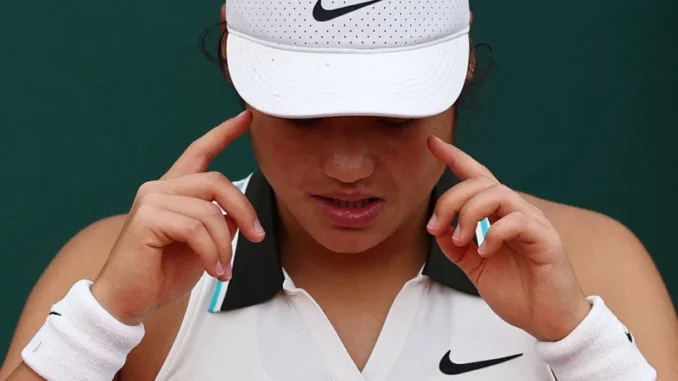
At just 18, Emma Raducanu became a global sensation by clinching the 2021 US Open title as the first qualifier to win a Grand Slam, captivating tennis fans and brands alike. Her meteoric rise from relative obscurity to international stardom transformed her into one of Britain’s richest young athletes, with a net worth estimated at £10 million by 2022. However, recent discussions in the tennis world suggest that her lucrative sponsorship deals, while boosting her financial standing, may be hindering her on-court performance, raising questions about the balance between commercial success and athletic focus.
Raducanu’s historic US Open victory in 2021, where she defeated Leylah Fernandez in straight sets, not only earned her £1.8 million in prize money but also opened the floodgates to endorsement opportunities. Within months, she secured eight major partnerships with prestigious brands spanning fashion, sports, and corporate sectors. These include sportswear giant Nike and tennis equipment manufacturer Wilson, each reportedly paying her around £100,000 annually, as well as luxury brands Dior and Tiffany & Co., which together generate approximately £2 million per year. Additional deals with British Airways, Evian, HSBC, and Porsche further bolster her earnings, with her sponsorship portfolio valued at over £10 million annually. Raducanu’s marketability, fueled by her youth, talent, and global appeal, has made her a darling of brands, with her social media presence—boasting 2.5 million Instagram followers—amplifying her commercial value.
Despite this financial success, tennis legend Chris Evert, an 18-time Grand Slam champion, has voiced concerns that these endorsements may be derailing Raducanu’s career. Evert argues that the young Brit was “thrown into the deep end” after her US Open triumph, with the influx of commercial commitments overwhelming her development. “Emma is a beautiful girl, and that probably didn’t help. The endorsements came in, the coaches were coming in and out, and still her expectations are right up there now,” Evert told reporters. Her comments highlight the pressure Raducanu faces to maintain her elite status while juggling high-profile sponsorship obligations.
Raducanu’s on-court performance since her 2021 breakthrough has been inconsistent, plagued by injuries and early tournament exits. In 2023, she underwent surgeries on both wrists and her left ankle, missing major tournaments like Wimbledon and the French Open. Her world ranking, which peaked at No. 10 in July 2022, plummeted to No. 289 by the end of 2023 due to limited play. In 2024, she showed signs of recovery, climbing back to No. 57 and reaching the quarterfinals of the Korea Open, but a first-round loss to Sofia Kenin at the US Open underscored her ongoing struggles. Raducanu herself expressed disappointment after the defeat, stating, “I feel down… I feel sad. Obviously, this is a tournament I really want to do well in.” Her preparation choices, including a month of training in London instead of hard-court events in America, have also drawn scrutiny, with some questioning whether her off-court commitments influenced her schedule.
Raducanu and her team have pushed back against criticism that her sponsorships detract from her tennis. Her agent, Max Eisenbud, has emphasized that her commercial activities are carefully managed, limited to 18 days per year, with shoots scheduled in the afternoons to prioritize morning training. “We could have done 50 days of shoots,” Eisenbud noted, adding that Raducanu turned down millions to focus on her sport. He also highlighted the support of her sponsors during her injury-plagued 2023 season, stating, “My partners have really backed me and supported me even in a year out. So anything that I can do to give back, give extra is really important to me.” Raducanu echoes this sentiment, noting that working with top brands has taught her about “quality control, almost perfectionism, the detail, the planning,” which she applies to her tennis.
Despite these defenses, the debate persists about whether Raducanu’s sponsorships are a blessing or a curse. Her company, Harbour 6 Ltd., reported a profit of nearly £10 million in 2023, largely from endorsements, demonstrating her off-court success. Yet, her winless streak since the US Open and a current ranking of No. 60 as of March 2025 suggest that recapturing her 2021 form remains a challenge. Porsche, one of her key sponsors, recently clarified that their global ambassador agreement continues, dispelling rumors of a split, but uncertainty surrounds other deals nearing renewal, especially with her ranking outside the top 50.
Raducanu’s story is one of extraordinary talent navigating the complexities of fame and fortune. Her ability to balance her commercial empire with her athletic ambitions will likely define the next phase of her career. As she prepares for upcoming tournaments, including a potential return to the French Open, the tennis world watches closely to see if she can silence her critics and reclaim her place among the sport’s elite. For now, Raducanu remains a polarizing figure—a symbol of both unparalleled potential and the perils of early success.
Leave a Reply